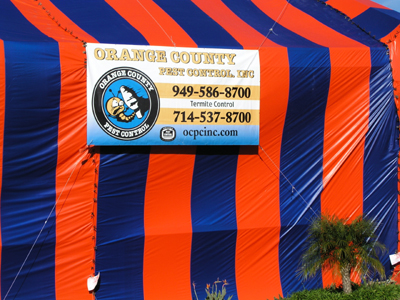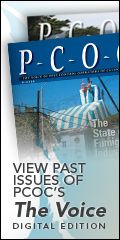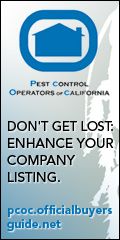News Briefs
Pest Control Operators of California
August 2010
We are now in the final weeks of the 2009 – 2010 legislative session. The session actually began in December of 2008 when legislators were sworn in. Similarly, this December, a new crop of legislators will be sworn in for the 2011 – 2012 session. This information is important for a number of reasons. First, bills introduced in the first year of a session can be "carried over" to the second. However, all bills this August will die unless they pass out of the Legislature and are signed by the governor. Secondly, this is important because it highlights that a new crop of legislators will be arriving in Sacramento in December as a result of being elected in November....... so....
Our PAPCO trustees, in conjunction with our legislative advocacy team, came up with a plan last February based on working with the most friendly bunch of business legislators possible. This fluid plan (yes, it can change during the course of a year as a result of the June primary election results) – involves many different moving parts. One of the most important is getting to know our elected representatives and, more importantly, educating them on pest control issues and letting them know who to contact if they have any questions... putting names to faces.
That is why, over a period of 12 months, we have set up breakfasts, lunches and dinner with state senators and assemblypersons both in Sacramento and in their districts. The criteria used for setting up such events is the strategic importance of each individual to our industry. Thus, we have broken bread with the current Assembly Speaker John Perez, Sen. President pro tem Darryl Steinberg and the chairs of the Business and Professions Committees – where all our bills go. We have also met with legislators whom we have identified as upcoming in the leadership process... we normally try to complete two a month.
This is an important way that PCOC creates value to the industry (protecting the pest control industry in California), but most importantly to YOU, our members. It is unfortunate that many PCOs take advantage of the good work that PCOC does by NOT being members.
Please advertise the critical importance of belonging to PCOC to your colleagues as you talk to them... encourage them to attend your local district meeting..... and if you sense there is opportunity for us to sign them up, let Billy Gaither know!
|
News Release |
For Immediate Release
PEST CONTROL COMPANIES COMPETE IN SEVENTH ANNUAL FUMIGATION BANNER CONTEST
Orange County Pest Control Announced as 2010 Winner
INDIANAPOLIS — Aug. 2, 2010 — The Pest Control Operators of California (PCOC) and Dow AgroSciences, the manufacturer of VIKANE® gas fumigant, are pleased to announce the winners of the seventh annual "Fumigation Banner Bonanza Contest." The contest recognizes California fumigators for displaying easy-to-read, professional and creative signs at fumigation sites.
This year's first-place prize was awarded to Orange County Pest Control, Inc. of Laguna Hills, Calif. The winning banner features a termite being stomped on.
"We are excited about winning," says Tom Meany, owner of Orange County Pest Control, Inc. "And a special thanks to Beneficial Exterminating for its help in promoting our business."
Finishing in second place was Tiger Termite Control Inc. of Chino Hills, Calif. Taking third was a banner from Clark Pest Control of Lodi, Calif. Ecola Termite & Pest Control Services, based in Los Angeles, earned fourth place.
Participating fumigation companies submitted color photos of their banners, which included their business name, logo and contact information. Banners were judged on readability from a distance, professionalism, visual impact and attractiveness. Pest control companies with the winning banners will be given gift certificates of their choice in the following amounts: first place, $1,250; second, $1,000; third; $500; and fourth, $250.
"We're proud to sponsor PCOC's contest as a way to help our fumigator partners build their businesses," says Elisha Priebe, Dow AgroSciences product manager for VIKANE gas fumigant.
For more information about fumigation with VIKANE, visit www.TermiteTenting.com.
# # #

The 2009-2010 legislative session has reconvened, and you can review the matrix here: Legislative Matrix.
A total of 637 licensed child care centers responded to the survey conducted for DPR by the Center for Children's Environmental Health Research at the University of California, Berkeley, School of Public Health. The survey questionnaire was mailed to 2,000 randomly-selected child care centers out of approximately 12,000 licensed centers in California.
Ninety percent of California child care centers that responded to the survey on pest problems and pesticide use reported at least one indoor or outdoor pest problem, according to a report released today by the Department of Pesticide Regulation (DPR). Ants were cited as the No. 1 problem both inside and outside the facilities.
The survey found that many of the child care centers that responded are using pesticide sprays and foggers that can potentially expose children and staff to residues on surfaces and in the air, and that many are not complying with notification requirements. It also found that although most centers were not familiar with the phrase "IPM," many seem to understand the concepts and are using IPM methods.
IPM is a strategy to prevent and treat pest problems using a combination of prevention, monitoring, record keeping and control methods such as eliminating food sources and sealing cracks and crevices in buildings where pests can enter. Chemical controls that pose the least possible hazard to human health and the environment are used only after careful monitoring and when non-chemical methods have failed. The use of pesticides contained in baits, gels or traps are exempt from the law.
Here is a link to the DPR survey for further information:
http://apps.cdpr.ca.gov/schoolipm/childcare/pest_mgt_childcare.pdf
BED BUG SEMINARS
On Sept. 8, 2010 in Oakland and on Sept. 10, 2010 in Anaheim, PCOC and NPMA will be hosting all-day seminars on bed bugs. Our target audience will be the hotel industry, apartment managers association, property managers and other related associations. These seminars will include presentations on bed bug facts and will include a panel of California PCOs to answer questions. At each location will be an exhibit hall where PCOC member companies will be able to sponsor a booth and be available to interact with the seminar participants. You will find registration forms on the association website under "Upcoming Events."
EPA RENOVATION, REPAIR AND PAINTING PROGRAM
PCOC will continue to monitor this federal EPA program and provide updates on a timely basis.
ENDANGERED SPECIES STIPULATED INJUNCTION
PCOC will continue to monitor this federal EPA program and provide updates on a timely basis.
DONATIONS TO DR. VERNARD LEWIS'S LAB
It is important for the industry to continue its support of Dr. Lewis's lab. Several donations have been made and can be viewed on the lab's website at: http://nature.berkeley.edu/upmc/funding.php
PCOC still maintains a link to make donations on our website under the "protecting the consumer" link.
Visit http://www.naylornetwork.com/cpc-nwl/assets/endorsed%20programs2.pdf to view the full article online.
Driver distraction presents a serious and potentially deadly danger. According to the National Highway Traffic Safety Administration (NHTSA), in 2008, 5,870 people died and an estimated 515,000 people were injured in police-reported crashes in which at least one form of driver distraction was reported on the police crash report.
While these numbers are significant, they may not state the true size of the problem, since the identification of distraction and its role in a crash can be very difficult to determine using only police-reported data.
Distracted driving comes in various forms, such as cell phone use, texting while driving, eating, drinking, talking with passengers, as well as using in-vehicle technologies and portable electronic devices. There are also other, less obvious forms of distractions, including daydreaming or dealing with strong emotions.
What Employers Can Do
1. Ban texting while driving on the job. You can use the president's executive order banning texting and driving for federal employees as a template. (See www.whitehouse.gov/the-press-office/executive-order-federal-leadership-reducing-text-messaging-while-driving.)
2. Know state laws. California bans the use of hand-held devices and texting while driving. See www.distraction.gov/state-laws/ for a list of other states that ban hand-held devices and/or texting while driving. Make sure your employees know the law as well.
3. Create a safety culture. Make it clear to employees that you expect they will NOT talk or text on their cell phones while driving on company time or in company vehicles. Ensure that there are no negative consequences for employees who wait for a safe opportunity to take or return a call or text.
4. Have employees sign a contract that says they will not violate the organization's ban on texting and driving. Include a provision to advise employees that if a crash occurs, the employer has the right to subpoena the employee's phone records, and if he/she was using a cell phone when the crash occurred, the crash will be considered preventable and the driver will assume all financial responsibility.
5. Conduct informal observational surveys of cell phone use at the entrances and exits of your business. Publicize the results to reinforce your distracted driving policy. Provide small incentives such as coupons, music download cards, special privileges like a free day of parking, etc., to employees observed driving distraction-free.
6. Visit the Network of Employers for Traffic Safety's website (www.trafficsafety.org) to see what 24 leading companies are doing about company driver cell phone use. Consider integrating some of these policies into your organization's cell phone policy.
For more suggestions on improving worker safety, please contact the PCOC Insurance Program Department at Jenkins Insurance Group: (877) 860-7378.
TEMPORARY NPMA LOGIN FOR JOINT MEMBERSHIP
LOGIN: 313501
PASSWORD: PCOC
PCOC Web site password for 2010-2011: "termite"
Please remember, the password changes every July 1!
Department of Fish & Game
www.dfg.ca.gov
Department of Food & Agriculture
www.cdfa.ca.gov
Department of Pesticide Regulation
www.cdpr.ca.gov
Find Your Legislator
www.leginfo.ca.gov/yourleg.html
Healthy Schools Act
www.schoolipm.info
Structural Pest Control Board
www.pestboard.ca.gov





